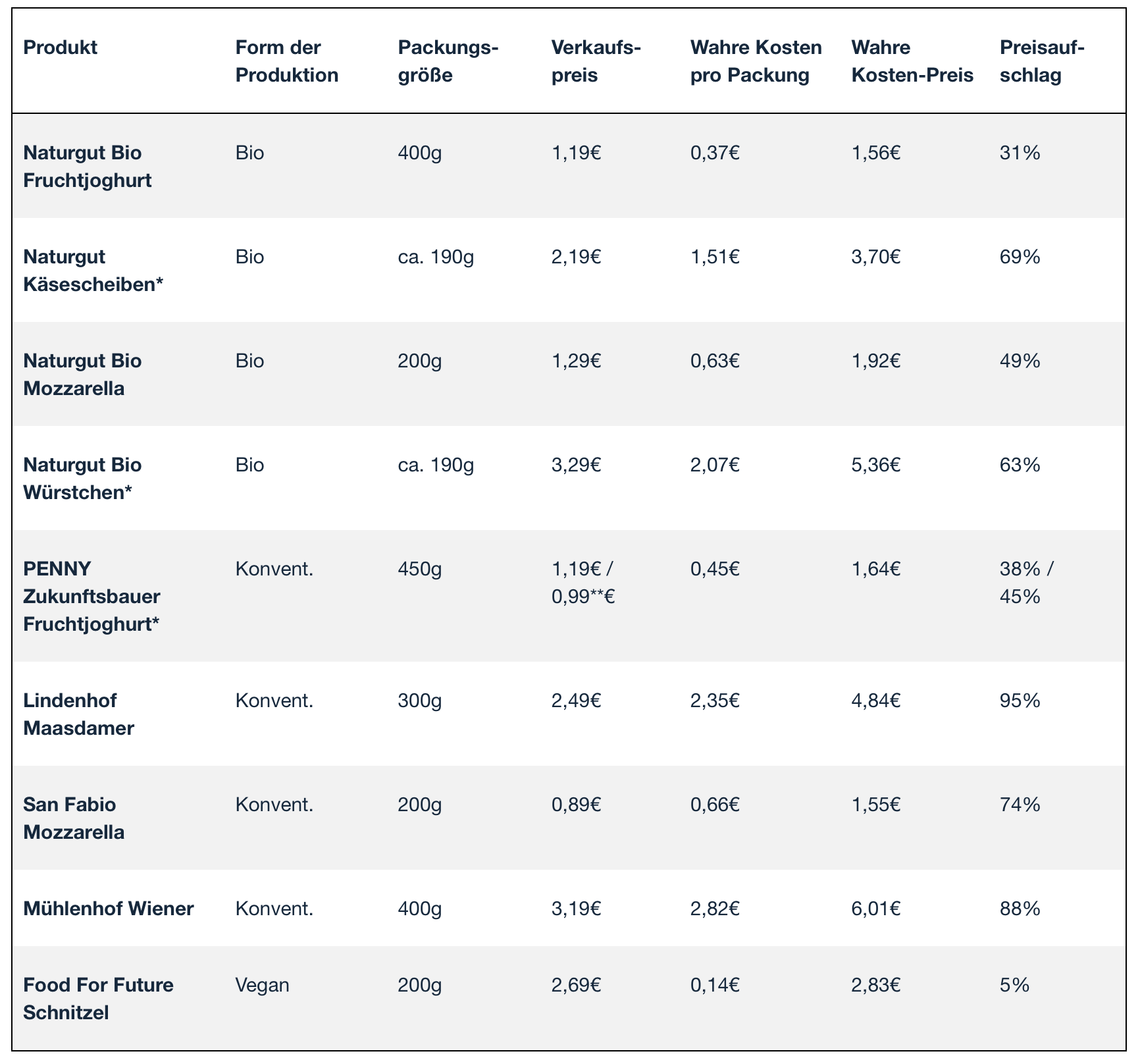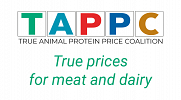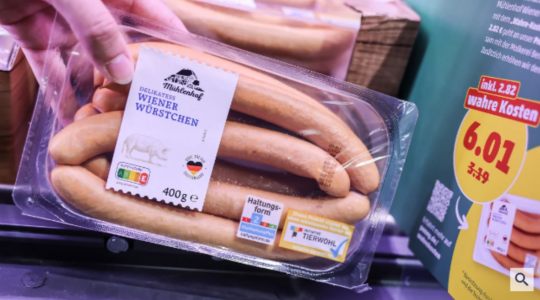Supermarket Penny True Price Week successful: less meat/dairy
Supermarket Penny dared to take a controversial action: demand more money for food by showing the “true costs”. The difference was donated to a green farm project. This is how the customers reacted during the week: 50-70% less was sold of specific meat and cheese products as a result of nearly doubling prices. A Wiener sausage increased in price from 3,19 euro to 6,02 euro (88% increase), Maasdammer cheese increased from 2,94 euro to 4,84 euro (95% increase) while the organic meat and dairy products increased with 63% and 49% in price.
The German Supermarket Penny presented the results in January 2024 of the 'true cost' campaign held in 2150 Penny stores in the week from 31 July - 5 August 2023. In this week the prices of nine products were sold for the 'true price' including all environmental costs. This meant that some meat and cheese products nearly doubled in price; a vegetarian product only increased 5% in price. The week was a joint initiative of the grocer, PENNY/Rewe, and two research projects at the Technical High School Nuremberg (Prof. Dr. Tobias Gaugler) and the University of Greifswald (Dr. Amelie Michalke) . Gaugler and Michalke both know the TAPP Coalition; they work together in an EU funded project TrueCost, coordinated by Wageningen University, also very active in true pricing food projects and research.
These “true prices” comprise the regular sale price and the surcharge for the true costs of the environmental impact, which were calculated by the University. The surplus revenue and an additional 50,000 euros will benefit the “Zukunftsbauer” project, which aims to increase energy efficiency in agricultural businesses in the German Alp region (farmers who deliver dairy to Penny).
The higher the environmental surcharge, the greater the drop in demand, they saw at Penny. Nudging on the basis of price therefore works, responds Antoine Geerinckx of CO2Logic: "People are not willing to spend more money on products that are unhealthy or have a high environmental footprint. If the real cost were to be passed on, you would push consumers towards more sustainable products.". Jeroom Remmers, director of TAPP Coalition, said: "The pilot shows that if governments start with environmental eco- or CO2 taxes on food, meat and dairy consumption would fall with approximately 50%. This is what is needed for climate, biodiversity and health reasons. Meat and dairy cause 80% of food related GHG-emissions, so its logical that 'true pricing' these emissions make meat/dairy prices higher. The EU committed itself to reduce GHG-emissions 85-90% by 2040; for agriculture and food this means we need to pay for GHG-emissions linked to our food, especially from meat and dairy. The EU Climate Board, the FAO and the IPCC report all say the same".
The campaign was indeed a success: 53% of respondents said that the campaign had made them more aware of the real price
Last summer, there was a lot of excitement and media attention in Germany and globally, surrounding Penny’s “true cost campaign”. Many people, including politicians, complained about the artificially raised prices, while others praised the discounter for its foresight. The research results of a study have now been published in which 2,255 people were asked about their purchasing behavior before and after the promotional week. One of the results: Sales figures did not fall as much as expected.
Penny had collected the “true” prices for nine selected products for one week - i.e. the amount that would actually have to be charged when all environmental damage caused by production was taken into account. As a result, products from cheese to Vienna sausages became up to 94 percent more expensive. There were lower markups for organic products. According to its own information, the retail chain wanted to create more awareness of the environmental impact of food production. There were interesting results from the Penny discounter's “true cost campaign. It was expected that with such high markups on the price, many customers would not cooperate. But according to the study authors, this was not the case. Among other things, this is due to the accompanying science communication and the connection with the donation. 84 percent of customers who bought the products despite the price increase said that the donation was a strong reason for the purchase. The supermarket chain Penny, which is part of the Rewe Group, donated the additional income - supplemented by a corporate donation of 50,000 euros - to a project for climate protection and the preservation of family-run farms in the Alpine region. According to the company, a total of more than 370,000 euros was raised.
The campaign was indeed a success: 53% of respondents said that the campaign had made them more aware of the true cost of food, while 38% felt that the action had sparked a political debate. Although that debate did not always work out in Penny's favor: 46% called the campaign greenwashing. After all, the criticism was that not all costs have been charged and that the supermarket chain continues to offer (too) low prices. Meat and milk consumption is declining already for a long time in Germany; this kind of true pricing projects can contribute to a further decline and awareness of high environmental external costs per kg meat and dairy.
A similar "true price project was started in the Dutch supermarket chain Albert Heijn with coffee in 3 shops. Here the higher 'true price' of a few cents extra was a voluntary option. Only 13% of customers paid the 'true price'. This shows that true price projects in supermarkets could best be not a voluntary option, but an obligation for all during a period, like the Penny pilot. Starting with low price increases, for instance only for the true prices related to climate change, could be a good next step for more European supermarket price projects, according to Jeroom Remmers, director TAPP Coalition.
“True Prices”: Penny customers don’t buy as much less as expected
Although the number of sales did not fall as sharply as expected, Penny still sold fewer of the products overall than usual. There were regional differences: In the new federal states, the decline in sales figures was particularly severe at up to 70 percent. In the west and south of Germany, sales of promotional products fell the least; in many places it was 'only' up to 50 percent.
Key project objectives achieved
"The current debate surrounding the transformation of German agriculture once again emphasises the relevance of the issue of true costs for our society. I am delighted that with our week we have succeeded in drawing broad attention to the topic of true costs of food," explains Stefan Görgens, COO PENNY, in the run-up to the publication of the balance sheet. One in three people consider the PENNY project to be suitable for to initiate a political debate on the topic. "The success of the campaign confirms us to consistently continue our broad commitment to sustainability."
Dr Amelie Michalke, sustainability scientist at the University of Greifswald, on the main findings: "In general, the greater the mark-up for environmental impact costs, the more customer demand falls. 85 per cent stated that the main reason for not buying the products was the price. Customers make a slight distinction between organic and conventional products: although both show a downward trend, the decline in sales of organic products is consistently somewhat lower. As motivation to buy the products despite the high "True Cost" price, buyers of the campaign products state that they always bought them (93%), but also their interest in sustainability (86%). In addition, respondents were convinced by the connection to Zukunftsbauern (83%). Only the vegan product, with a low price premium of only 5%, was in greater demand during the week.
Support for measures to implement true costs politically (via information, price surcharges or taxes) fell over the week (-19%, -27%, -22%) as a result of the campaign. Consumers were actually confronted with the True Cost through the campaign." Here
presumably plays a role that customers are acutely sensitised by the persistently high prices in almost all areas of life.
The monetisation of damage caused to the climate and environment for the selected food products were calculated based on the publications of Pieper et al. (2020) and Michalke et al. (2023) and include the categories of soil, climate, water, and health.
The campaign also provided information about the differences between conventional and organic cultivation. Based on the calculations, it was found that the true cost component of the plant-based (vegan sausage) product is distinctly lower than that of the animal products. The subsequent environmental costs of organically produced products are also lower than those of conventional (meat and cheese) products, but both cultivation models caused externalities.
More information:
Wahre Kosten Kampagne 2023 - Ergebnisse.pdf
Presseordner_Nutzungsguidelines.pdf
FAQ_Ergebnisse Kampagne_deutsch.pdf



